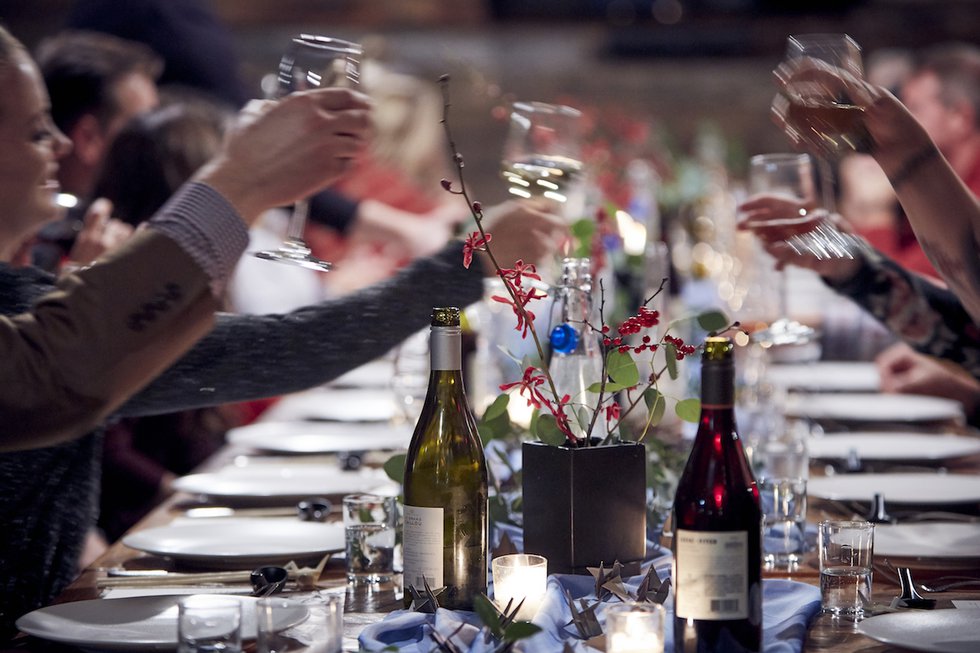Singer Mary Chapin Carpenter hosts a traditional holiday feast at her farm house, and then she and friends break out the guitars. Yahoo!

Kindred Spirits
Mary Chapin Carpenter’s home, with guests, in the gleaming

Mary Chapin Carpenter

MacKenzie Carpenter and Peyton Tochterman

Mary Chapin Carpenter chats with Robin Williams (right) and Maddie Ferguson

Boundary waiting for scraps

Napkin with cockscomb

The table is set

After dinner talk

Toast
A toast

Ted Pitney (left)

Robin and Linda Williams playing in the barn after dinner

Mary Chapin Carpenter

Shannon Worrell
Thanksgiving dinner is an occasion laced with tradition. That is why, typically, it is spent with family and friends—the most traditional of guests. And the meal, too, tends to be traditional, of course. There are Thanksgiving dinner risk-takers out there—would you like some sushi with your creamed onions?—but they tend to be few in number.
We, being Southern, like our tried-and-true food dishes, as well as our local food suppliers. And so we put together a very traditional Thanksgiving dinner—with food almost totally sourced in Virginia—and then went looking for someone to host a quasi-intimate gathering. We could not have found a more gracious hostess than Mary Chapin Carpenter—the well-known singer and songwriter who lives in a charming, traditionally-styled farmhouse just outside of Charlottesville (with a fabulous view of the Blue Ridge Mountains) and who loves to cook and entertain for family and friends when she is not on the road, performing.
Carpenter grew up in Princeton, New Jersey, graduated from Brown University, lived with her family in Japan for a couple of years (her father worked for Life magazine) then spent more than 20 years in Washington, D.C. singing and playing guitar and piano before she was signed, in the 1980s, by Columbia Records. Her second album, 1989’s State of the Heart produced two country-music hits, and her third record, 1990’s, Shooting Straight in the Dark, featured one of her biggest career chart-toppers, “Down at the Twist and Shout.” Next came what would be her most successful album, Come On Come On, released in 1992. It went quadruple platinum—by which time the music industry had taken notice. Between 1991 and 1995, Carpenter won five Grammy awards, including four straight for Best Female Country Vocal Performance.
Carpenter, who was born in 1958, had a major health scare in 2007 when she suffered a pulmonary embolism. She recovered, but didn’t perform for about three years, during which time, she says, she felt “strangeness and fear and dislocation,” adding: “Everything came to a screeching halt.” The health problem, she reveals, “altered my existence, and you do have that sense of fear and hiding from the world and not knowing what will happen next.”
Happily, with improved health what came next was her 12th record, the just released and well-received Age of Miracles. Even better, she went on the road again to promote it. She spent last summer touring the United States and the fall performing in the United Kingdom. How was it? “It’s been fantastic,” Carpenter told me. “The audiences have been extraordinary—so welcoming and kind and generous. I was sitting with a friend the other day, and I didn’t know what to say except that I feel this intense gratitude. Being back at work means so much to me.”
The title track limns what Carpenter says is the “deep desire” humans have to be connected to the world. The song was partly inspired by the 2007 uprising in Myanmar, led by Buddhist monks. “It was surreal to watch that take place,” says Carpenter. “When we see something like that extraordinary display of bravery and courage, we want to be connected to it. I did.” She cites a lyrical snippet from the song that evokes her post-hospital blues—“now you sleep with the covers pulled over your head—and you never remember to dream”—but adds that making the record “woke me up…It allowed me to come out of my cave and realize that there is nothing more important than feeling connected.”
Certainly, home is a place where Carpenter has that feeling, too. Her inviting house, which sits on a knoll, “lends itself to people,” says the singer. “It’s a wonderful place to sit outside on the porch, or inside by the fire, and the barn is a wonderful place too.” She says that because she traveled so much for so many years, she seldom cooked. But during her recovery, “I was home for periods of time and became glued to TV cooking shows. I taught myself how to cook, and there is nothing more nurturing for the soul and the spirit. There is nothing I like more than cooking for family and friends.”
Sitting out on her porch, on a misty evening, Carpenter and some of her best friends from the Shenandoah Valley—musicians Robin and Linda Williams, Ted Pitney, Peyton Tochterman, Rusty Spiedel, Shannon Worrell, Bahlmann Abbott (who designed her house), along with her sister MacKenzie, came together for a down-home holiday feast prepared by Chef J Frank. The group enjoyed a sugared ham (from Turner Ham of Fulks Run) roasted turkey breast with mushroom sauce, cornbread stuffing (from Byrd Mill in Ashland), sweet potatoes (from Quail Cove Farms in Machipongo), fresh bean sauté and, for dessert, pumpkin mousse with ginger shortbread, candied pumpkin and caramel sauce. (Let us pause now and let our culinary nerves settle.)
Need we say: The friends brought guitars and a banjo, and joined by Terri Allard and Jason Pollock, all strolled down to Carpenter’s homey barn after the meal for a “guitar pull.” Sitting in a circle, each musician sang a song of his or her own, and played along with the others—an elemental, heartfelt communion of spirits. Says Carpenter: “There is nothing better than following a feast with music. Everybody enjoys it, whether they play or not.”








